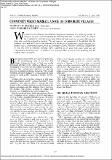| dc.contributor.author | Bates, Robert | |
| dc.contributor.author | Curry, Amy Farmer | |
| dc.date.accessioned | 2009-08-25T20:42:21Z | |
| dc.date.issued | 1992 | |
| dc.identifier.citation | Bates, Robert H., and Amy Farmer Curry. 1992. Community versus market: a note on corporate villages. American Political Science Review 86(2): 457-463. | en |
| dc.identifier.issn | 0003-0554 | en |
| dc.identifier.uri | http://nrs.harvard.edu/urn-3:HUL.InstRepos:3224743 | |
| dc.description.abstract | We return to the literature on collective villages and reexamine its central arguments. In doing so, we focus on an institution for allocating land that we call the Rule. As claimed by its advocates, the Rule secures land allocations that result in outcomes differing from those that would be achieved by markets. The outcomes are not constrained to be efficient. But the economic costs paid fail to secure the attainment of guarantees of subsistence, greater equality, or a greater sense of community resulting from the elimination of envy. However, in the face of high levels of risk, the form of collective property rights embodied in the Rule may create what we call "communities of (mis)fortune," in which no one can envy others' gains or losses resulting from the random shocks of nature. | en |
| dc.description.sponsorship | African and African American Studies | en |
| dc.description.sponsorship | Government | en |
| dc.language.iso | en_US | en |
| dc.publisher | Cambridge University Press | en |
| dc.relation.isversionof | http://dx.doi.org/10.2307/1964233 | en |
| dash.license | LAA | |
| dc.title | Community versus Market: A Note on Corporate Villages | en |
| dc.relation.journal | American Political Science Review | en |
| dash.depositing.author | Bates, Robert | |
| dc.identifier.doi | 10.2307/1964233 | * |
| dash.contributor.affiliated | Bates, Robert | |


